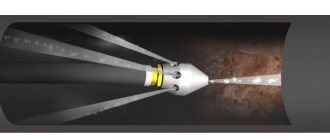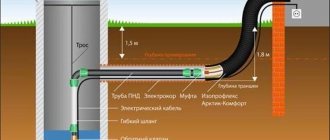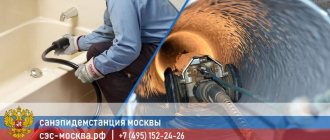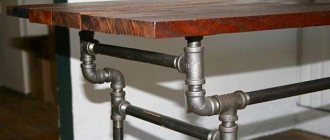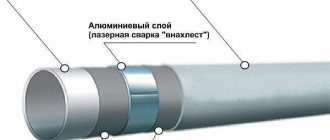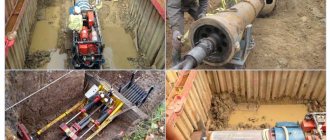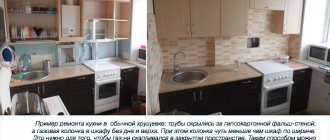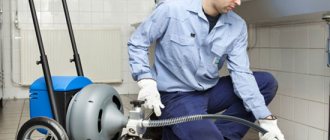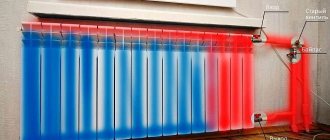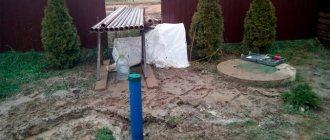The presence of calcium and magnesium carbonates and hardness salts in water is the basis for the subsequent formation of deposits in pipes. Scale in pipes differs from other contaminants in being more durable. It cannot be removed using ordinary household products designed to remove blockages. That is why it is better to contact specialists if problems arise.
The main causes of clogged pipes
Salts and minerals settle on the walls of the pipes, reducing its useful diameter.
In old multi-story buildings, water supply systems have been functioning for decades. During this period, deposits appear on the inner walls of the pipes. Plaque covers not only them, but also parts of faucets and shut-off valves. Common causes of blockage:
- Errors of installers when installing a pipeline.
- High content of salts, minerals, slag, scale in the supplied water.
- Long-term operation of the system without preventive maintenance, lack of filters.
The amount of deposits depends on the pipeline material and the chemical composition of the supplied fluid. Metal pipes are most susceptible to deposits. Corrosion products consisting of iron oxides appear on their inner surface. The growths can fill up to 50-70% of the pipeline diameter. Plastic lines are smooth, but over time they become covered with limescale.
What appears on the walls of pipelines and mixers:
- rust;
- deposits of mineral particles;
- dissolved metal salts;
- biological fouling.
Difficulties that may arise when descaling pipes
Currently, trade organizations offer a wide variety of products, so if you wish, you can easily purchase a set of equipment for creating water hammer, or reagents intended for chemical descaling of pipes . Don't take unnecessary risks. These technologies are too complex, so an inexperienced person will not be able to clean scale in pipes without accidents and damage.
If you called specialists, you can use the following methods to check the results of their actions:
- Set a certain pressure and measure the time it takes to completely fill a container of a certain volume before and after cleaning;
- If this is possible, then you need to visually check the hole in the pipe;
- When workers descale pipes, make sure that contaminants leave the system along with the fluid flow;
- In hot water pipes, the inlet and outlet temperatures can be measured before and after the relevant operations;
- After completing all the work, it is necessary to test the system with high pressure supplied to it, to ensure that there are no leaks or damage to the connections;
- It is necessary to contact only specialized organizations that provide written guarantees for the pipe cleaning services they provide.
What technologies will prevent the formation of harmful pollutants?
Scale in pipes does not need to be removed, but the causes of its formation can be eliminated in advance. To do this, you can use installations with polyphosphate backfill, with ion exchange resins, electromagnetic converters, and reverse osmosis systems. In some cases, it will also be necessary to involve specialists in order for the created protection to be sufficiently effective and economical during operation.
When comparing costs, it must be taken into account that all of the above descaling methods have a strong impact on pipes and other components of the water supply system. Even with normal hardness (7 mEq/l), it will be necessary to clean it annually. In a few years, it is possible that major repairs and replacement of individual sections of the water supply system will be required.
Protection will also not be free. So, if you use a household generator for magnetic conversion, you will have to take into account the fact that it consumes about six watts of electricity per hour. With constant switching on, 840 W will be spent per week, and 3,600 W in 30 days. Multiply this value by the current tariff and you will get the amount you will have to pay for a month of use. Then you can make a comparison with cleaning methods and draw appropriate conclusions.
Signs of deposits
Rusty water and low pressure are the first signs of a problem.
Rust deposits change the color and taste of the water. The liquid becomes reddish, and an iron taste appears. Sediments with a mineral or biological structure also cause turbidity in the stream. The main sign of plaque formation is a decrease in water pressure. Apartment residents should ask their neighbors about the status of their water supply. If the rest of the system is working properly, there is a blockage in the line section.
Disadvantages of overgrown water pipes:
- pressure and estimated water consumption are reduced;
- a suspension of small particles appears in the water;
- the surface of the highway is destroyed;
- Chlorine quickly disappears, the degree of disinfection decreases;
- the operation of the shut-off valves is disrupted.
If there is significant sediment formation in the old main, it is best to replace the pipes. After long use, their surface is severely damaged by corrosion, deposits will appear very quickly. In new water supply systems, it is enough to clean the cold water pipe in the apartment without replacing it.
How to detect scale
In a closed heating system, salt deposits and contaminants are not visible, but even in a standing position, sediment forms in the water. When starting heating, scale makes itself felt:
- pipes and radiators warm up very slowly;
- some radiators generally remain cold;
- the boiler overheats;
- the costs of gas, electricity, etc. increase;
- Extraneous noise appears in the system.
The degree of internal contamination with salts can be determined by submitting water from the heating system for analysis.
Effective cleaning methods
Sometimes it is enough to rinse the faucet screen.
The blockage requires prompt removal. Cleaning water pipes from the inside at home is usually not difficult. Cold and hot water lines need to be flushed periodically. Most often, plaque appears in the following areas:
- Filters - meshes for catching large particles are installed at the entrance to the apartment, in front of meters and mixers. Depending on the quality of the liquid, they clog at different rates. The filters are easy to clean by simply rinsing them with water. Complex deposits and rust are removed with an acid solution.
- Bent sections of pipes where foreign matter settles.
- Taps and mixers - layers appear on the internal parts of the structure.
- Joints – rust particles or sand cling to rough surfaces.
Lime deposits on the elements of the hot water supply system lead to a drop in the temperature of the coolant. Energy consumption for heating increases. Lime deposits are extremely hard and difficult to remove. Hot water pipes are cleaned using chemicals and mechanical devices. He considers the most effective effects on plaque to be ultrasound and electromagnetic waves.
Cleaning methods vary in speed and effectiveness. They are selected based on the degree and nature of the blockage.
Mechanical
The cable is convenient for cleaning both water supply and sewer systems.
Build-ups and blockages inside the pipes are removed using mechanical devices. One of them is a plumbing cable. The device is made of metal wire and has a handle for rotation. It is used to clean water pipes from stones, sand, and lime deposits. The device nozzle is selected according to the diameter of the line. Before starting work, turn off the water. Access to the inside of the pipeline is carried out through a removed tap. The cable is advanced with rotational movements. The removed layers are washed after opening the valves. You can make the device yourself. You will need flexible, strong wire. A loop is constructed at one end, and a handle for rotation at the other.
An easy way to remove rust from water pipes is to tap them with a hammer. Before tapping, open the tap completely. The oxide will leave the system with the flow of water. Impacts must be careful not to damage the metal.
An effective method is hydraulic flushing. This is a labor-intensive process that requires dismantling the clogged area. The pipe is cleaned with a stream of water supplied under pressure. In an apartment, it will be difficult to carry out the procedure on your own.
Chemical
Hard lime deposits from hard water are dissolved with acid. Acetic or citric acid is used in everyday life. Sediment on water pipes is removed with special cleaning products. They are sold in hardware stores. The drug is poured into the system, blocking access to household appliances. The solution is left for 1-2 hours, according to the instructions for use. Then the pipeline is washed with water by opening the taps. To protect yourself from chemical residues, you need to drain the water for 30-40 minutes. The method is costly and risky. When choosing chemical reagents, the material of the pipes is taken into account. Strong acid (hydrochloric acid, phosphoric acid) can corrode plastic. When working with chemicals, it is important to follow safety precautions.
Ultrasound
Ultrasonic waves have a destructive effect on any deposits. They remove scale more effectively than chemical reagents. Under the influence of devices, re-deposition of calcium salts is prevented. Ultrasound causes structural changes in chemical compounds in a liquid.
If apartment residents do not rely on their own strength to carry out plumbing work, it is better for them to contact a special service. There are companies in every city that clean water pipes and sewer lines.
What methods will help clear scale from pipes?
Since only professionals have the full amount of necessary knowledge, let’s study what technologies they use in practice. Along the way, we will note their advantages and disadvantages, and some limitations.
Abrasive cleaning
Scale in pipes can be removed by adding sufficiently durable particles to the fluid flow. As they pass through the system, they will destroy the formations that have gradually arisen. When using the abrasive pipe descaling method, the following disadvantages should be taken into account:
- High consumption of abrasive material. Per one sq.m. The surface to be cleaned requires about 30 kg of appropriate powder.;
- The need to use special material, for example quartz sand with certain parameters;
- Low efficiency. Within an hour, using an abrasive descaling technique, about 0.18 m2 can be cleaned.
One of the varieties of this technology can be called mechanical removal of contaminants using special brushes, devices and devices. Such methods are used in industrial settings where the corresponding holes are large enough.
Water hammer
Water hammer with pneumatic action. To clean scale in pipes using this technique, specialized equipment is used. It connects to the system and creates sudden bursts of high-pressure compressed air. As a result, a wave is formed that travels at a speed of more than 1.5 km per second.
The technology for descaling pipes using water hammer is interesting because it allows you to remove even heavy contaminants. In this case, there is no need to dismantle pipes, turn off the heating radiator and other elements of the system. As a result, the total production time will be reduced. In this case, there are no restrictions on the time of operations. All actions can be performed during the heating season, since the equipment will be turned off for a short time.
If we compare water hammer with replacing pipes and dismantling radiators, then, of course, this method will be 60-90% cheaper. It is also good because it does not use harmful chemical compounds.
The effectiveness of hydropneumatic technology decreases as the water supply system becomes more complex. It is not used if it is too worn out. Work operations should only be entrusted to experienced specialized companies that are able to do everything correctly and can provide a reliable guarantee.
To create stronger hydraulic shocks, electrically high-voltage pulses are used. If the discharge has sufficient power, then an increased pressure of up to 6-7 atmospheres is quickly created in the system. Such anti-scale filters are also useful for cleaning industrial installations, because they are capable of operating on pipes with large diameters, up to 320 mm.
Such a powerful effect can free areas that are completely clogged from blockages. In this case, even a complex pipe configuration will not be an obstacle. The advantages and limitations are similar to those presented above.
Cleaning pipes from scale using chemicals
As a rule, scale in pipes is removed using orthophosphoric, sulfamic, hydrochloric and other chemicals. The duration of the procedure will depend on the nature of the contaminants and their distribution over the internal surfaces. Of course, the specific composition of the chemical reagents used is also of some importance. In practice, more than a day may be spent. Here are some disadvantages of this technology:
- The effect of citric acid not only on scale in pipes, but also on working surfaces and seals;
- Excessively aggressive influence limits the number of applications of this technique;
- The occurrence of defects at joints impairs the ability to repair certain types of equipment;
- Precise selection of components is available only to highly qualified specialists;
- Used chemicals must be disposed of using appropriate safety measures;
- This technology will not work if scale in the pipes has completely filled the section.
Preventive measures
Without regular maintenance, the pipeline wears out quickly. Lime deposits not only reduce water pressure, but also negatively affect the metal. Under a layer of plaque, it rusts faster and leaks appear. Preventive measures include installing a coarse filter. It is placed at the entrance, before the counter.
The part is a cylinder made of fine mesh. Filter material is stainless steel. The mesh traps large debris and rust particles. It screws into the cork flange. If the water quality is low, the cylinder quickly clogs. Regular cleaning of the filter is required, otherwise the pressure will decrease. To prevent the formation of limescale, it is recommended to use softener filters.
We recommend
DOCKER THERMO is an effective solution for flushing heating systems. Recommended for treating boilers, high and low pressure boilers, condensers, heat exchangers, pipelines, and for flushing household water heating appliances. The selectively active composition of the substance allows you to flush systems not only with metal, but also with plastic or rubber tubes. Concentrate.
More details
Heating system installation
